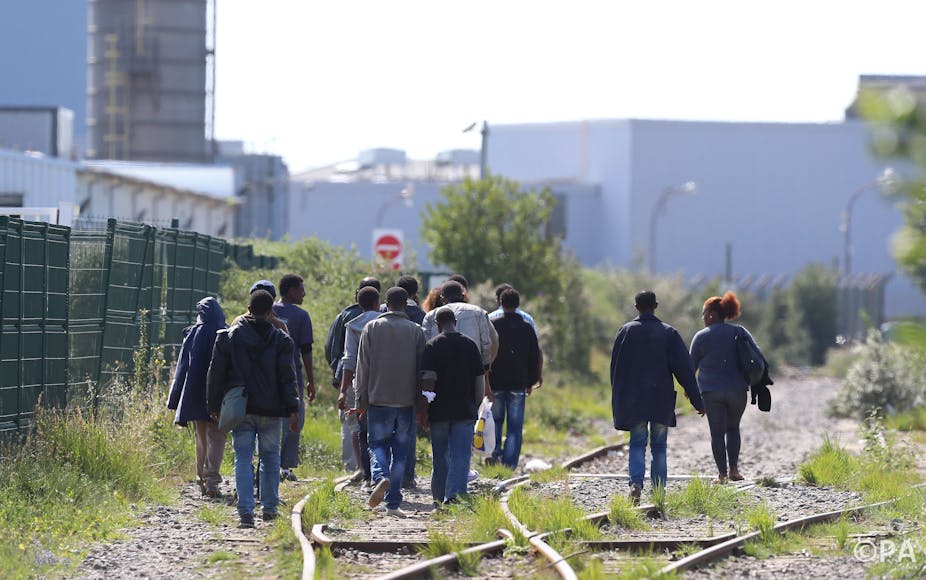Refugees in the UK and Sweden have been denied asylum based on flawed language analysis reports under a system that has been criticised by the UK Supreme Court.
Recent scandals have raised the question of whether the problem lies with the science behind language testing, or with the methods employed by commercial analysts – including one recently branded a convicted drug smuggler with bogus credentials.
Asylum seekers arriving with no documents have only their bodies, their stories and their speech to back up their claims of persecution. The idea that how we talk can reveal our origins underlies the Home Office’s current practice of language testing. For two decades, Language Analysis for the Determination of Origin (LADO) has been used in doubtful cases. In the UK, LADO reports involve a brief telephone interview with a language analyst employed by a private firm.
Questions about the testers
This controversial procedure is criticised by linguists, legal practitioners and asylum charities. The latest in a series of recent reports in The Independent alleges that one of the largest providers of language analyses, a Swedish company called Språkab, gave misleading and inaccurate information about the qualifications of one of its analysts.
In a letter to the Home Office, Språkab refers to the inaccuracies as a “typo”, but concedes that is has analysts that possess no academic qualifications in linguistics, only unspecified “internal education at Språkab”.
Even before these allegations were raised, the UK Supreme Court criticised the same analyst in May 2014, finding that he had overstepped the proper role of an expert witness by giving opinions on applicants’ credibility, a “wholly inappropriate” judgement which he lacked the expertise to perform.
The court also asked “serious questions about the basis on which the Språkab analysts felt able to establish with such certainty the geographical [origin]” of refugees. Both UK and Swedish asylum tribunals have rejected many Språkab reports by this language analyst on appeal.
Hugely complex task
But there is a wider problem underlying these kinds of language assessments, which are routinely used by governments in North America, Europe and the Pacific. We are linguists with acknowledged expertise in how languages are learned, used, lost and how they vary across social circumstances, and experts with considerable experience evaluating LADO reports – but even we find assessing asylum seekers’ speech an extremely complex task.
A key question is what evidence and expertise are needed to assess whether a person’s language supports their claim to truly originate from a particular country. The answer depends not only on the history (often disputed) of the refugees themselves, but on the linguistic situation in the region.
Many African countries have scores or hundreds of indigenous languages, often spoken alongside colonial or creole languages. Geographical boundaries rarely coincide with linguistic ones, which straddle borders, while dialects vary considerably from region to region.

How people speak is determined by how they were socialised linguistically: not only where they grew up, but the languages they used habitually with parents, guardians or friends – often during temporary and traumatic residences in several regions or countries, while fleeing persecution. It has been shown that after some years in another country, native speakers of a language can no longer reliably be differentiated from those who learnt it as a second language – and that individuals who have suffered persecution and trauma are more often perceived as foreign-sounding.
Need for review
Yet the Home Office does not make relevant personal background information available to language analysts. Last year’s Supreme Court judgement stresses that asylum tribunals should critically evaluate LADO reports “in the light of all the evidence”.
Earlier guidance said that “little more [was] required to justify a conclusion” than such a LADO report. But the Supreme Court called this “unduly prescriptive and potentially misleading”, and found that asylum tribunals must assess the strength of reasoning and expertise underlying each individual report, not simply accept them at face value.
Most importantly, the court called for a review of legal guidance from asylum tribunals on the use of linguistic evidence and arguments in LADO reports. Such criticism supports the view of linguists around the world, who have long been extremely wary of the LADO procedure.
The Guidelines for the use of Language Analysis, drawn up by an international group of linguistic experts and endorsed by a dozen international linguistic associations, identify the criteria necessary to make LADO a valid and reliable process for determining an asylum seeker’s fate.
In the wake of the Supreme Court judgement, and amid reports that the Home Office may have “wrongly deported” hundreds of Somalis to Kenya or Tanzania because the Språkab analysts failed to recognise their Bajuni dialect, we hope the forthcoming review of the use of linguistic evidence in asylum tribunals – the framework of which is yet to be confirmed – will lead to more reliable procedures in a better asylum system.

